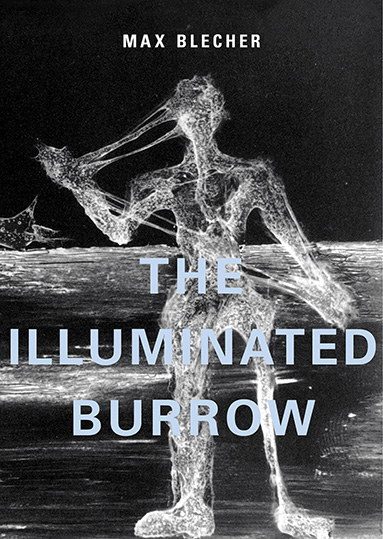| |

[ excerpt ]
book view

More about Blecher
and his work here
also by the author:
Adventures in
Immediate Irreality
Scarred Hearts
Transparent Body
& Other Texts
|
|
the illuminated burrow
A Sanatorium Journal
by Max Blecher
translated from the Romanian by Gabi Reigh
afterword by Gabriela Glăvan
Max Blecher began writing The Illuminated Burrow in 1937 and continued working on it until his death the following spring,
but its full version was only published posthumously in 1971. It was the final “novel” in what can be called a trilogy that
includes Adventures in Immediate Irreality
and Scarred Hearts, and like those, its imaginative distortion of real experiences is reminiscent of Bruno Schulz as well
as the Surrealist autofiction of André Breton and Michel Leiris. Set in the sanatoria where Blecher received treatment for spinal
tuberculosis, the ostensible narrator is forced to confront the power and limitations of memory as he attempts to capture the last
moments of life as they pass “like ash ... through a sieve,” one final effort to reclaim the beauty of days spent straddling the
boundary between waking and dreaming, encountering the marvelous both inside and outside the sanatorium's walls, inside and outside
his very body. As his physical powers decline and he becomes permanently bedridden, the narrator’s life migrates to his inner consciousness,
an “illuminated burrow” where reality is indistinguishable from fantasy, where the surreal and the mundane seamlessly fuse to enact the fears
and fascinations elicited by the vibrant world that is gradually slipping away.
In a letter to Saşa Pană, Blecher explained his method:
My ideal of writing would be to transpose into literature the high tension found in a Salvador Dalí painting. That cool dementia, perfectly legible and essential, is what I would like to achieve.
Explosions that occur between the walls of the room and not at a distance between chimerical and abstract continents. ... Surrealism should hurt like a deep wound.

The imagination is nothing more than an extension of matter.
|
— Roger Caillois
|
[Blecher] leaves an imperishable sense of having drawn you in so thoroughly that the book he has made of his
body – this riposte to the illness that ravaged him – and his metaphorical title, illuminated burrow, lives on the page as if it were off it.
|
— Allan Graubard, American Book Review
|
There is a distinct Proustian interiority to Blecher’s writing here, as the narrator’s inability to get out of bed or accomplish anything without help
forces him to delve into his own mind, his memory, and imagination to seemingly spontaneously unravel searching, haunting narratives that often use
the surrealist method of sublimating deep-seated fears and desires into everyday objects. This, for Blecher, is life inside the body’s burrow. [...]
The Illuminated Burrow is uncanny, strange, illuminating.
|
— Stephan Delbos, B O D Y
|
The beauty of Blecher’s prose and the focus of his observations often pull the reader away from the depth of
suffering, as does the variety of events he experiences as he grapples with the unfathomable.
|
— Rick Henry, Rain Taxi
|
The novel is a powerful final testament that insists on delving into, with the utmost intensity, the manifold nature of each moment – apparent and
invisible, corporeal and fantastical, light and dark, secret and hallucinatory. |
— Sanders Isaac Bernstein, The London Magazine
|
Everything that happens in the outside world is filtered through [Blecher's] uncommon intellect, processed almost beyond recognition,
then sent back into the world as exquisite, highly penetrating prose. [...] Gabi Reigh’s translation is so good that it reads as if Blecher wrote the book in English. |
— Costica Bradatan, The TLS
|
There’s something unsettling about reading a work of autobiographical fiction in which the author traces the
arc of their own waning health. But Blecher’s work is more complex than that description makes it sound: imagine a Venn diagram
charting the overlap between Pessoa and Kafka and you might have a sense of where to start. And some of the prose, in Reigh’s
translation, is stunning ... |
— Tobias Carroll, Words Without Borders
|
|
|
 |
|

ISBN 9788086264585
166 pp., 135 x 190 mm
hardcover with ribbon bookmark
2 color plates
illustrated endpapers
literature : novel
release dates:
UK/Europe: October 2022
US/Canada: November 2022
order directly:
airmail shipping & handling incl.
also available from:
Wordery
Indiebound
Bookshop.org
Amazon US
Amazon UK
Central Books
within EU: Kennys
e-book [978-80-86264-61-5]
Amazon US
Amazon UK
Amazon Canada
Amazon Australia
Amazon Germany
Amazon Japan
Apple iBooks
Kobo
|